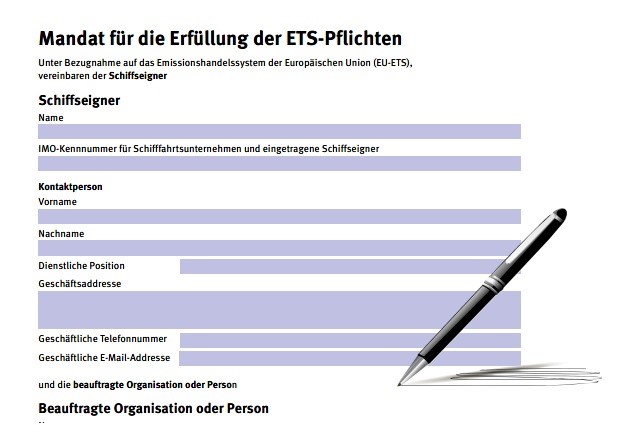The maritime industry’s integration into the EU Emissions Trading System (EU-ETS) in 2024 remains a challenge for shipping companies concerned:
With the prospect of the many more reporting obligations and submission deadlines to come, shipowners are increasingly considering delegation options to manage MRV and EU-ETS obligations effectively. Only last week the German Administering Authority (DEHSt) published a document template to address that need. The “Mandate of compliance with EU ETS 1 obligations” aims to facilitate the delegation of responsibility from shipowners to persons specified under the EU-ETS in accordance with Art. 1 (d) (w) DIR (EU) 2023/959 and Art. 1 (1) IMPLEMENTING REGULATION (EU) 2023/2599.

Find it here: Form: Mandate for compliance with EU ETS obligations (dehst.de)
Understanding Responsible Entities:
In a previous article the complex reporting and surrendering obligations established under the EU-ETS and updated MRV since their coming into force in January 2024 were briefly outlined. Responsible entity for compliance under the EU-ETS and MRV is the “shipping company” defined in Art. 1 (d) (w) DIR (EU) 2023/959 as either:
- the registered shipowner (responsible by default), or
- the ISM manager who has agreed to take over all the duties and responsibilities imposed by the International Management Code for the Safe Operation of Ships and for Pollution Prevention, set out in Annex I to Regulation (EC) No 336/2006 of the European Parliament and of the Council (responsible by mandate).
By default the primary responsible person under the EU-ETS and the MRV is the registered shipowner. Via mandate, he may delegate the full responsibility to a manager or bareboat charterer, who has assumed the responsibility for the operation of the ship from the shipowner and is ISM-certified. The mandate is invalid if the person to assume responsibility from the shipowner doesn’t hold an ISM “Document of Compliance”.
Notably, the responsibility cannot be shared. Responsibility of compliance with EU-ETS and MRV-obligations for one ship must lay with the same entity. Thus, shipowners will surrender all responsibility once they decide to mandate the ISM Manager. For the purpose of the mandate the EU-ETS and MRV obligations are to be conceived as one.
The content-requirements of effective mandate are specified in IMPLEMENTING REGULATION (EU) 2023/2599 and are subject to control by the Administering Authority. In overreaching fulfilment of their responsibility, the German Administering Authority, DEHSt, has published the above template addressed to the shipowner that meets all requirements set out in the Implementing Regulation and should be used accordingly.
A transfer of responsibility is not irreversible. The mandate may be revoked at any time. Nr. 4 of the template states that effective revocation requires a concurring revoking action by both parties, the shipowner and the ISM Manager. As the responsible party by default, the shipowner is likely to automatically regain responsibility under EU-ETS and MRV and a claim for reassignment of the MOHA account which is held by the responsible party under the EU-ETS. But it remains to be seen how the Administering Authorities will handle revocations in the future.
An ISM-certified person may assume the responsibility for EU-ETS and MRV obligation of multiple shipowners at the same time. However, they all require a separate mandate. Unintentionally, the EU-ETS may have created a new commercial service area for ISM management in the maritime industry.
Check list:
- Download the template (available in English and German): Form: Mandate for compliance with EU ETS obligations (dehst.de)
- Fill in all the required information in either German or English: The shipowner must list all ships in respect of which the ISM Manager will assume responsibility for EU-ETS obligations and whose emissions fall within the scope of Directive 2003/87/EC, as well as their respective IMO ship identification number.
- The mandate must be electronically signed by both the shipowner and the ISM manager.
- Electronically submit the mandate to the Administering Authority via the DEHST platform together with the application to open the MOHA (Maritime Operators Holding Account).
Critical review and outlook
The rigid definition of the responsible „shipping company“ that doesn’t allow for any modification, seems to defy general maritime law not only regarding its wording but also regarding the lack of contractual discretion in the imposition of obligations. General maritime law is characterized by its various stakeholders and complex contractual constructs in order to manage responsibilities according to the various commercial stakeholders interests. While at first glance it may seem that the EU-legislator simply ignored those characteristics, thereby creating multiple issues for the practical implementation of the EU-ETS, this is a misconception.
A glance at the explanatory memorandum of both the DIR (EU) 2023/959 and IMPLEMENTING REGULATION (EU) 2023/2599 shows that the EU-legislator purposely chose to divert from the system of multiple-stakeholder-responsibility for the EU-ETS to ensure its effectiveness and enforceability. Creating an economic incentive to reduce greenhouse gas emissions for each ship would’ve been impossible if the responsibilities of reporting, purchase and surrender of emission allowances could’ve been distributed between different parties that can change each voyage. It would’ve also prevented the creation of comprehensive emission reports and the effective control of EU-ETS obligations by the administering authorities of the Member States.
Finally, the mandate may serve to transfer responsibility, but the EU-ETS provides for another practical tool to ensure just distribution of the financial burden of the Emissions Trading System in line with stakeholders’ interests. By envisioning a reimbursement claim for the responsible shipping company against the entity operating the ship, Art. 3 gc DIR (EU) 2023/959 addresses operational efficiency of the EU-ETS and upholds the “polluter pays”-principle. This does not only take account of stakeholders‘ interests in general maritime law but also serves to achieve environmental objectives by creating an incentive for the operational parties to reduce greenhouse gas emissions. Each Member State is tasked to take the necessary measures to ensure such a claim; – a questionable approach in an industry as international as the maritime industry?
This reimbursement claim, possible contractual arrangements and BIMCO clauses shall be the subject of our next article in the EU-ETS/MRV-miniseries.

